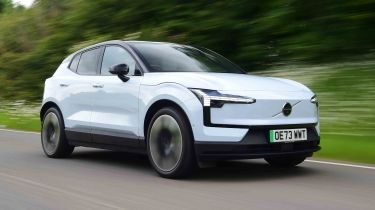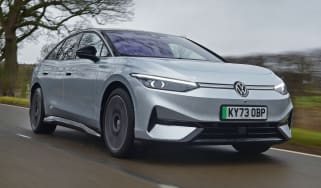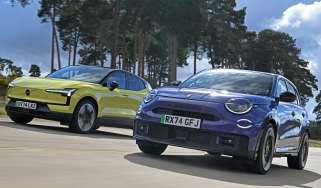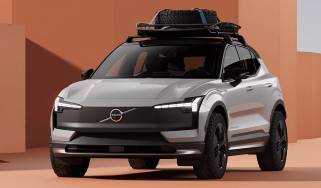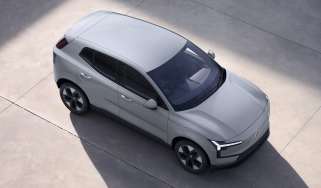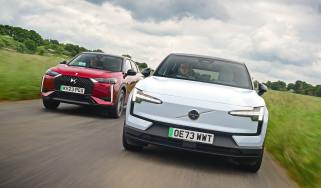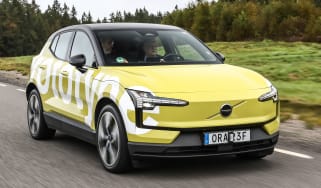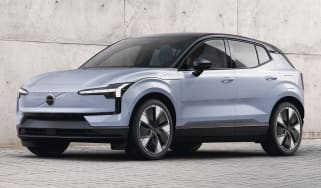Volvo EX30 review
The Volvo EX30 is a fantastic all-round car for the money, with fine handling, and a competitive electric range

Is the Volvo EX30 a good car?
The Volvo EX30 has impressed us on numerous occasions. It manages to be good to drive, has a minimalist interior that feels special, offers plenty of standard safety features and equipment despite a reasonable price, and tops it all off with eye-opening performance and a competitive electric driving range.
The Performance model is an intriguing hot hatch alternative for those who prefer to fly under the radar. The EX30 package would be even better if Volvo could iron out some ergonomic question marks around that touchscreen, though.
| Key specs | |
| Fuel type | Electric |
| Body style | Five-door small SUV |
| Powertrain | 51kWh battery, 1x e-motor (Single Motor) rear-wheel drive 69kWh battery, 1x e-motor (Single Motor Extended Range) rear-wheel drive 69kWh battery, 2x e-motor (Twin Motor Performance) four-wheel drive |
| Safety | 5-stars (Euro NCAP, 2024) |
| Warranty | 3yrs/60,000 miles |
How much does the Volvo EX30 cost?
Volvo is pitching the EX30 as a premium small electric offering, although a quick look at its starting price of just under £33,000 for its entry-level Core trim suggests otherwise: that’s less than the entry-level Vauxhall Mokka Electric. Our preferred Plus trim comes in at around £34,500 in Single Motor form, or a little over £39,000 if you want the Extended Range version of this trim with greater electric driving range. The priciest Ultra trim clocks in at closer to £42,500 with rear-wheel drive, or just shy of £45,000 in Twin Motor Performance guise.
Three trim levels are available. The entry-level Core gets a 12.3-inch central touchscreen display with sat-nav, rear parking sensors, a reversing camera, blind spot monitoring, LED headlights with auto high beam, and 18-inch alloy wheels. Upgrade to our recommended Plus trim for heated front seats and steering wheel, front parking sensors, wireless phone charging, dual-zone climate control, and an electric tailgate.
The top-spec Ultra trim adds 20-inch alloy wheels, a 360-degree parking camera, a fixed panoramic sunroof, a self-parking system, electric front seats and a 22kW on-board charger.
You can choose between two different battery sizes, with the greater capacity battery pack gaining a more energy-efficient heat pump. There’s also the choice of rear-wheel drive or four-wheel drive. The latter is reserved for the high-performance model, so don’t expect any off-roading potential.
The least expensive EX30 has a single-motor driving the rear wheels with 268bhp, and a 51kWh (49kWh useable) battery pack. Those after more range can go for the Single Motor Extended Range, which provides the most driving range in an EX30. It uses the same electric motor as the cheaper model, but adds a fairly sizeable 69kWh (64kWh usable) battery for just under 300 miles of range.
On, then, to the Performance version. It feels like we have explored this slightly hair-raising road before with the Smart #1 Brabus, with which the hottest EX30 has a lot in common. Both offer sub-four-second 0-62mph times, 69kWh batteries, and 422bhp power outputs, although the EX30 gets from 0-62mph a fraction quicker than its Smart sibling.
Electric motors, performance & drive
| Model | Power | 0-62mph | Top speed |
| Volvo EX30 Single Motor Core | 268bhp | 5.7 seconds | 112 mph |
| Volvo EX30 Single Motor Plus Extended Range | 268bhp | 5.3 seconds | 112mph |
| Volvo EX30 Twin Motor Performance | 422bhp | 3.6 seconds | 112mph |
We’ve only driven the Volvo EX30 Twin Motor Performance Ultra model so far. It takes pretty much the same amount of time to say that name as it does for the car to cover the 0-62mph sprint – a quite ludicrous 3.6 seconds. That’s a little bit swifter than the Smart #1 Brabus, and the same as a Bentley Continental GT Speed, Porsche 911 Carrera 4S, or, to single out a car that was a supercar icon of its day, the Ferrari Enzo.
This high-performance Volvo offers very few visual clues to its potent acceleration, looking almost identical to the regular model. It could be one of the most unassuming performance cars out there, and will certainly raise some eyebrows if you make a speedy getaway at the traffic light Grand Prix. The fact that the Performance model is available from a little under £42,500 means buyers looking for hot hatch pace in an under-the-radar, ‘Q-car’ package might have found their new hero.
Fortunately, this Volvo’s chassis has much of the sophistication lacking from the unfinished-feeling Smart. There’s a firmness to the ride quality that doesn’t ever cross the line of being harsh, which means that there’s little pitch or dive under hard acceleration. In the torrential conditions of our first UK drive, it proved possible to still excite either axle with clumsy throttle inputs, but the balance is neat, and once the steering is switched into its heaviest ‘firm’ setting, it feels precise and positive. It's a shame, then, that the stability control cuts in abruptly at the first sign of wheel slip or when the car gets upset by a mid-corner bump.
There is regenerative braking just like most electric vehicles, which is a system designed to generate a little bit of electricity that goes back into the battery when you lift off the accelerator to slow down. It’s not as variable as in the Kia Niro EV, which uses paddles on the steering wheel to adjust the strength of the slowing force. To switch this system on or off in the EX30, you need to go into a systems setting menu buried within the infotainment system, which is highly distracting while driving.
Aside from a little wind rustle at higher speeds, there aren’t many distracting noises inside the EX30. The ride maintains its composure at motorway speeds, while the Twin Motor Performance (as you'd expect) keeps enough in reserve to get past slower traffic.
Range, charging & running costs
| Model | Battery size (useable) | Range | Insurance group |
| Volvo EX30 Single Motor | 49kWh | 213.8 miles | 35E |
| Volvo EX30 Single Motor Extended Range | 64kWh | 295.8 miles | 37E |
| Volvo EX30 Twin Motor Performance | 64kWh | 279.6 miles | 40E |
The Volvo EX30 comes with two battery sizes. The largest battery size comes with a heat pump, and can be had in both rear-wheel drive, and four-wheel drive ‘Performance’ forms. The heat pump is a more efficient way of heating the interior in colder weather without using as much of the main battery’s charge and helps to maintain driving range. The four-wheel drive cars sap a little range due to the weight penalty of having an additional electric motor up front, and because of the extra performance offered on these models impacting efficiency.
Kicking the range off is a 51kWh (49kWh useable) battery that provides up to 213.8 miles of range. For those wanting to go further on a charge, the Single Motor Extended Range model with a 69kWh (64kWh useable) battery gives a combined 295.8 miles of range. However, that still comes up short of our preferred Advance trim Kona Electric, which can travel up to 319 miles on a single charge.
The Twin Motor Performance version adds four-wheel drive and a healthy dollop of extra grunt, although this pegs the range back a little to 279.6 miles, although when we tested a Twin Motor Performance EX30 against a DS 3 E-Tense, the Volvo only managed efficiency of 3.5 mi/kWh or 224 miles total range using the useable battery size figure.
The smaller battery version has a maximum charging speed of 134kW, so if you plug it into a fast enough charger, you can get a 10-80 per cent top-up (going from roughly 20 miles of range up to 170 miles of remaining range) on a long journey in around half an hour. The larger battery model gets an increased 153kW peak charging speed to maintain a 10-80 per cent top-up (from roughly 30 miles of range up to 240 miles of remaining range) in under 30 minutes. This is where the EX30 has other rivals licked, because even our favourite Hyundai Kona Electric can’t be charged as quickly, taking over 40 minutes to be topped up between 10 and 80 per cent.
Most owners will probably use a 7.4kWh home wallbox charger to charge up their EX30, and utilise cheaper overnight electricity rates - if they have the right electricity tariff. This means refilling the 51kWh battery should take under 10 hours, while the 69kWh model will take under 12 hours.
The EX30 will be great for company car buyers looking to save some money on their Benefit-in-Kind (BiK) tax bill, because all versions sit in a lower band than a traditional petrol or diesel car, or a plug-in hybrid. It’s also exempt from road tax and the London congestion charge – at least until 2025.
According to our expert data, the EX30 is expected to retain between 47 to 52 per cent of its original value after three years or 36,000 miles. That’s a little ahead of the Smart #1 (47 to 50 per cent), Kia Niro EV (46-49 per cent), and Hyundai Kona Electric (46 per cent). The Single Motor Core is expected to retain the most value, while the Twin Motor Performance Ultra will lose the most.
Insurance is likely to cost more for the EX30 than its rivals. The single motor version starts in group 35, while the range-topping Performance model is in group 40. The #1 ranges from groups 30-38, while the Niro EV is lower still in groups 28-29. None match the Renault Megane E-Tech, which starts in group 25.
Design, interior & technology
The EX30 looks familiar to the brand's other SUVs, thanks in no small part to details like the ‘Thor’s’ hammer LED headlights and high-mounted rear lights. It’s chunky and substantial at first glance, even if, in reality, it is actually shorter than a Volkswagen Golf.
There are five exterior colours to choose from, and thankfully, all of them are free. You can also pick between four interior colours, although your options might be limited by the trim you choose. Pine is exclusive to Plus trim, and the top-of-the-range Ultra adds Breeze and Mist colour schemes into the mix.
Typical of Volvo, the dashboard design leans heavily on a minimalist aesthetic. There have also been some cost-cutting measures to achieve this price, but at first glance, Volvo has done incredibly well to hide them. The dashboard and seat covers feature woven fabrics and recycled materials – including one constructed from recycled denim and another from old PVC window frames. The overall effect looks unique and makes the cabin feel more expensive and special than anything at this price point.
While the simplified design looks good, we feel it’s gone too far in terms of useability. Almost everything is controlled via the central touchscreen; in some areas, like the Google-based navigation system, it’s brilliant, but there are flaws with almost every function being controlled through the screen. We don’t have an issue with electric mirrors buried within the sub-menu – most people will adjust them once and then leave them alone – but other useful functions, like the rear window demister, are too fiddly to access easily. Given that Euro NCAP will be incentivising manufacturers to maintain certain frequently used functions as a physical button to achieve a five-star safety rating, we hope this decision is reversed when the car is facelifted.
You’ll also need to get used to a window switch design that appears to be heavily influenced by VW and its ID electric cars. The speakers and electric window switches have been removed from all the EX30’s doors to save on space and enlarge the door pockets (it’s also a cost saving due to a reduction in the amount of wiring), with the switches moving to the centre console. Like in the Volkswagen ID.3 the front switches also control the rear windows when you press the ‘Rear’ button. We suspect you’ll get used to it over time, but it's not immediately obvious.
All versions come with a 12.3-inch central touchscreen in a portrait layout. In Tesla fashion, it displays all vehicle information and removes the driver instrument cluster from the dashboard, contributing to a cleaner look. We’d prefer a small supplementary screen attached to the steering column, like you’ll find on the ID.3, to display things like the speedometer, gear position, and trip information in front of the driver who needs that sort of information, rather than having to refocus from the road and look across at a screen. If Volvo is to persist with such a minimalist design, at least give us a head-up display as standard – like you’ll find on the Mazda MX-30 – to project all this important information onto the windscreen within the driver’s line of sight.
Sat-nav, stereo and infotainment
Like we mentioned in the section above, the central touchscreen displays and controls all vehicle functions. Below the speedo at the top of the screen comes the sat-nav, audio, and phone widgets, with the lowest section of the screen devoted to a row of commonly used functions followed by a section of actual switches at the bottom to control things like the windscreen demist function and the hazard warning lights – the latter has to be a physical button by law.
The system will ‘learn’ your most commonly used functions and place them on a shortcut page, but you cannot choose these yourself. Volvo says it will roll out over-the-air updates to improve the interface based on customer usage, so we’re curious to see how the system develops.
All EX30 models get Apple CarPlay smartphone connectivity with wireless charging, but not Android Auto. The system uses Google software with four years' worth of unlimited mobile data to use with apps on the system and for in-vehicle communication.
A 1,040-watt Harman Kardon premium sound system is standard from Plus trim and above, featuring seven speakers in total, including a dashboard soundbar and a subwoofer in the boot. The entry-level Core trim uses a five-speaker set-up with 100-watts of output.
Boot space, comfort & practicality
| Dimensions | |
| Length | 4,233mm |
| Width | 1,940mm (2,032mm inc. mirrors) |
| Height | 1,555mm |
| Number of seats | 5 |
| Boot space | 318 litres (main - to glass line), 19 litres front boot |
Let’s look at the Volvo EX30 range more generally first, because it sits in compact car territory that the brand hasn’t explored since the Volvo C30 hatchback almost two decades ago. The EX30 is almost identical in length to that noughties curio, but as fashion dictates, the car takes the more practical shape of a five-door small SUV rather than a three-door hatchback.
If you’re expecting a practical crossover, then the EX30 might not fit the bill. By the standards of cars in this segment, it’s a little tight in the back – the Jeep Avenger offers similar space, but is roughly 200mm shorter overall. In reality, it’s closer to compact premium hatchbacks like the BMW 1 Series and Mercedes A-Class in terms of size. Those in the back will also be impacted by a high floor that limits foot space under the front seats; headroom is fairly generous, though. Two ISOFIX child seat mounting points are provided on the rear bench's outer positions.
A 318-litre boot isn’t so large, but it is neatly shaped, and doesn’t look any more compromised than the class average. A small 19-litre storage area under the bonnet means you can keep the loose (and potentially dirty) charging cables away from your luggage in the main boot. A standard 60/40 split folding rear seat design increases the load area to 904 litres, which isn’t especially generous. The bigger Hyundai Kona provides 466 litres of space with the seats up, and 1,300 litres with the rear seats folded. Plus the Kona Electric can be had with a much more versatile 40/20/40 split folding rear seat in N Line trim and above.
The standard range, single motor model has a 1,000kg braked trailer towing capacity, while the Extended range models can pull up to 1,600kg, which is rather good for this size of electric car, and puts it above even the likes of the larger Skoda Enyaq and Volkswagen ID.4. We would suggest you take a look at your mirror set up, though. Like the Polestar 2, the EX30 has frameless door mirrors to which you can’t attach traditional extension mirrors, so you may need to invest in an alternative solution.
Safety & reliability
| Key standard safety features | Euro NCAP ratings |
|
The EX30 is too new to have been included in the latest 2024 Driver Power owner satisfaction survey, but Volvo, as a brand, has slipped down the rankings since last year, coming 16th out of 32 manufacturers in 2024 compared with 13th out of 32 in 2023. Safety, interior quality and front seat comfort were still highlights for owners, but they took issue with powertrains, running costs, and value for money.
Safety experts Euro NCAP have awarded the EX30 the same five-star high score as its sibling, the Smart #1. The EX30 scored higher than its other electric rival, the MINI Countryman Electric in the adult occupancy and safety assistance catergories, but the MINI was ahead in protection of children and vulnerable road users.
The Volvo EX30 does come with many standard safety features. For motorways and dual-carriageways, you have adaptive cruise control to keep you a safe distance from the car in front, a lane-keep assistance system to help keep you within your lane, and a blind-spot monitoring system to warn you of any vehicles alongside you as you go to change lanes. Around town, you have an autonomous emergency braking system to either mitigate or prevent low-speed collisions with other vehicles or vulnerable road users, such as pedestrians or cyclists. There’s also a road sign warning system that will, amongst other things, warn you of the current speed limit.
Volvo EX30 alternatives
The Volvo EX30 is an appealing small electric SUV for those who need a smart-looking, premium small SUV that’s zippy enough to nip into traffic in the city, yet still has the range and swift charging speeds that make the occasional long trip a possibility. It hits the market at a busy period for small EVs, with rivals on all fronts, including established competitors like the Hyundai Kona Electric – a rival already in its second generation and has been voted our Small Company Car of the Year in 2024. There are numerous other small electric SUV rivals out there, such as the DS 3 E-Tense, Jeep Avenger, Kia Niro EV and Peugeot E-2008, as well as similarly priced electric hatchbacks including the Cupra Born, Renault Megane E-Tech and Volkswagen ID.3, to name but a few.
The EX30 makes a good case for itself with a high list of standard safety features and equipment, plus a premium feel inside beyond its reasonable asking price. It’s also remarkably quick in Twin Motor Performance form, and even the standard model has more than enough power compared with its similarly priced and much slower rivals.
However, that extra performance will cost you because of its higher insurance group ratings, plus it isn’t as practical as our favourite small SUV, the Hyundai Kona Electric, which will be much more suitable for families. The Kona Electric remains our choice because it is more spacious, its interior is straightforward to use, and its excellent efficiency yields even greater range – despite having a smaller battery than the Volvo.
